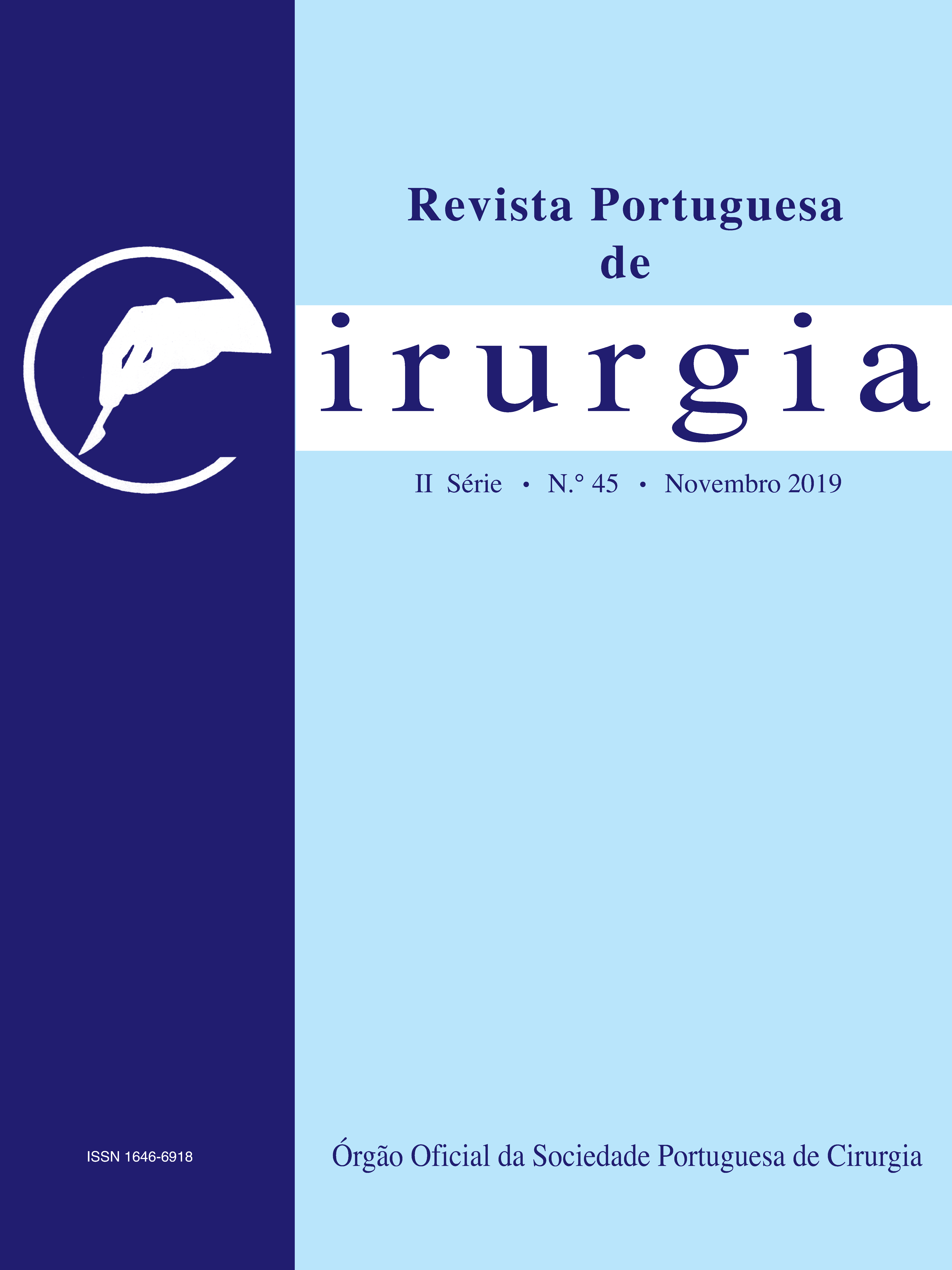Gut mediated syncope
Keywords:
gastrointestinal stromal tumor, syncope, imatinibAbstract
Gastrointestinal stromal tumor (GIST) is a rare mesenchymal tumor (0,3-3% of all gastrointestinal tumors), mostly found in the stomach and small intestine. In most cases, GIST is caused by a gain-of-function mutation in KIT gene, resulting in an abnormal proliferation of interstitial Cajal cells. We report the case of a 74-year-old man, with a history of ischemic heart disease, under double antiaggregation, who went to the hospital after an episode of syncope. Physical examination was unremarkable, and his exams only revealed an iron deficiency anemia (9.2 g/dL). Subsequent diagnostic investigation showed a colon adenoma that was excised endoscopically. He presented a new episode of syncope, associated with acute hemoglobin decrease (4.5 g/dL), without clinical evidence of blood loss. We repeated the studies (endoscopic and tomography), which were negative. In the meantime, a videocapsule study was performed, which found a mass in the jejunum, surgically excised, confirming the diagnosis of GIST; the true cause of anemia and syncope. One year passed, our patient is taking imatinib, with no evidence of relapse. Presenting this case report, we do a brief review of this theme. The diagnosis of GIST is not always linear. They are manifested mainly by gastrointestinal hemorrhage and anemia, and most are detected in endoscopic examinations or by computed tomography. Whenever possible, complete surgical resection is the treatment of choice, with adjunctive treatment with imatinib in high-risk patients. In the presence of an unresectable GIST or whose excision may result in great morbidity, imatinib may also be used as neoadjuvant. In advanced metastatic disease, treatment is only done with tyrosine-kinase inhibitors, and surgery is done only for some of the complications.
Downloads
References
2. Ertuk M, Van Der Abbeele A. Infrequent Tumors of the Gastrointestinal Tract Including Gastrointestinal Stromal Tumor (GIST). PET
Clin 3 (2008) 207–235.
3. Judson I, Bulusu R, Seddon B, et al. UK clinical practice guidelines for the management of gastrointestinal stromal tumors (GIST). Clin
Sarcoma Res (2037) 7:6.
4. Rutkowski P, Przybyl J. Extended Adjuvant Therapy with Imatinib in Patients with Gastrointestinal Stromal Tumors. Mol Diagn Ther
(2033) 37:9–39.
5. Efstathios P, Athanasios P, Papaconstantinou I, et al. Coexistance of a gastrointestinal stromal tumor (GIST), and colorectal adenocarcinoma. A case report. World J Surg Oncol 2007, 5:96.
6. Keung E, Raut C. Management of Gastrointestinal Stromal Tumors. Surg Clin N Am 2037; 97: 437-452
7. Nishida T, Blay J, Hirota S. The standard diagnosis, treatment and follow-up of gastrointestinal stromal tumors based on guidelines.
Gastric Cancer (2036) 39:3–34.
8. Lanke G, Lee J. How to best manage gastrointestinal stromal tumor. World J Clin Oncol 2037 April 30; 8(2): 335-344.
9. Miettinen M, Lasota J. Gastrointestinal stromal tumors: pathology and prognosis at different sites. Semin Diagn Pathol 2006;23:70-83.
10. Joensuu H, Martin-Broto J, Nishida T, et al. Follow-up strategies for patients with gastrointestinal stromal tumour treated with or without adjuvant imatinib after surgery. Eur J Cancer 2035; 53: 3633-3637
11. Hechtman J, DeMatteo R, Nafa K, et al. Additional Primary Malignancies in Patients with GIST: A Clinicopathologic Study of 260
Patients with Molecular Analysis and Review of the Literature. Ann Surg Oncol. 2035; 22(8):2633-9
12. Chok A, Goh B, Koh Y, et al. Validation of the MSKCC Gastrointestinal Stromal Tumor Nomogram and Comparison with Other Prognostication Systems: Single-Institution Experience with 289 Patients. Ann Surg Oncol 2035; 22: 3597-3605
13. Schrage Y, Hartgrink H, Smith M, et al. Surgical management of metastatic gastrointestinal stromal tumor. Eur J Surg Oncol 2038; 44: 3295-3300
14. Mehren M, Liu Y. Randomized Clinical Trials in Gastrointestinal Stromal Tumors. Surg Oncol Clin N Am 2037; 26: 545-557
Downloads
Published
Issue
Section
License
Para permitir ao editor a disseminação do trabalho do(s) autor(es) na sua máxima extensão, o(s) autor(es) deverá(ão) assinar uma Declaração de Cedência dos Direitos de Propriedade (Copyright). O acordo de transferência, (Transfer Agreement), transfere a propriedade do artigo do(s) autor(es) para a Sociedade Portuguesa de Cirurgia.
Se o artigo contiver extractos (incluindo ilustrações) de, ou for baseado no todo ou em parte em outros trabalhos com copyright (incluindo, para evitar dúvidas, material de fontes online ou de intranet), o(s) autor(es) tem(êm) de obter, dos proprietários dos respectivos copyrights, autorização escrita para reprodução desses extractos do(s) artigo(s) em todos os territórios e edições e em todos os meios de expressão e línguas. Todas os formulários de autorização devem ser fornecidos aos editores quando da entrega do artigo.



